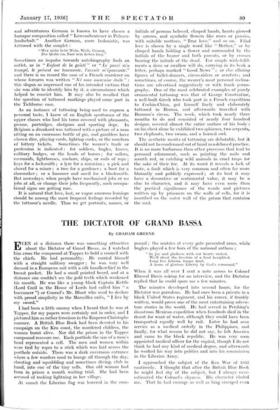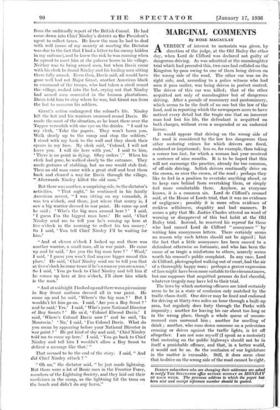THE DICTATOR OF GRAND BASSA
By GRAHAM GREENE
I had been a little uneasy when I heard that he was at .Tappee, for my papers were certainly not in order, and I pictured him as rather ferocious in the Emperor Christophe manner. A British Blue Book had been devoted to his campaign on the Kru coast, the murdered children, the women burnt alive. Nor did the prison in the Tappee compound reassure me. Each porthole the size of a man's head represented a cell. The men and women within were tied by ropes to a stick which was laid across the porthole outside. There was a dark cavernous entrance where a few warders used to lounge all through the day, shouting and 'squabbling and sometimes diving, club in hand, into one of the tiny cells. One old woman had been in prison a month waiting trial. She had been accused of making•lightning in her village.
At sunset the Liberian flag was lowered in the corn- pound ; the sentries at every gate presented arms, while buglers played a few bars of the national anthem ;
" In joy and gladness with our hearts united, We'll shout the freedom of a land benighted. Long live Liberia, happy land, A home of glorious Liberty by God's command."
When it was all over I sent a note across to Colonel Elwood Davis asking for an- interview, and the Dictator replied that he could spare me a few minutes.
The minutes developed into several hours, for the Dictator was garrulous. He had once been a private in a black United States regiment, and his career, if frankly written, would prove one of the most entertaining adven- ture stories in the world. He had served in Pershing's disastrous Mexican expedition when hundreds died in the desert for want of water, although they could have been transported equally well by rail. Later he had seen service as a medical orderly in the Philippines, and finally, for what reason he did not say, he left America and came to the black republic. He was very soon -appointed medical officer for the capital, though I do not think he had any kind of medical degree, and afterwards he worked his way into politics and into his commission in the Liberian Army.
I approached the subject of the Kru War of 1932 cautiously. I thought that after the British Blue Book he might feel shy of the subject, but I always over- estimated the Colonel's shyness. His character eluded me. That he had courage as well as brag emerged even from the unfriendly report of the British Consul. He had come down into Chief Nimley's district as the President's agent to collect taxes. He knew the man he had to deal with well (some of my. anxiety at meeting the Dictator was due to the fact that I had a letter to his enemy hidden in my suitcase), and he knew the risk he was running when he agreed to meet him at the palaver house in his village. Neither was to bring armed men, but when Davis came with his clerk he found Nimley and his leading men sitting there fully armed. Even then, Davis said, all would have gone well had not Major Grant, another American black in command of the troops, who had taken a stroll round the village, rushed into the hut, crying out that Nimley had armed men concealed in the banana plantations. Davis told him to stay where he was, but Grant ran from the but to summon his soldiers.
Grant's action endangered the colonel's life. Nimley left the but and his warriors swarmed round Davis. He made the most of the situation, as lie leant there over the Tappce verandah with one eye on the drinks. " I said to my clerk, Take the papers. They won't harm you. Walk slowly up to the camp and stop the soldier's.' I stood with *my back to the wall and they shook their spears in my. face. My clerk said, Colonel, I will not leave you. I will die here with you.' I said to him, ' There is no point in dying. Obey orders '." When his clerk had gone, he walked slowly to the entrance. They made gestures of stabbing, but no one would stab first. Then an old man came with a great staff and beat them back and cleared a way for Davis through the village. " Afterwards Nimley killed the old man."
But there was another, a surprising side, to the dictator's activities. " That night," he continued in his faintly American accent, " I was sitting on my verandah, it was ten o'clock, and there, just where that sentry is, I saw a big warrior dressed in war paint. He came up and he said : Who's the big man around here ? ' I said, ' I guess I'm the biggest man here.' He said, Chief Nimley send me to tell you he's coming up here at five o'clock in the morning to collect his tax money.' So I said, You tell Chief Nimley I'll be waiting for him.'
"And at eleven o'clock I looked up and there was another warrior, a small man, all in war paint. He came up and lie said, Are you the big man here ? " Waal,' I said, I guess you won't find anyone bigger round this place.' He said,. Chief Nimley send, me to tell you that at five o'clock he come to see if he's a man or you arc a man.' So I said, You go back to Chief Nimley and tell him if he. conies up here at five o'clock, I'll show him which is the man.'
"And at midnight I looked up and there was a piccaninny in Boy Scout uniform dressed all in war paint. He came up. and . he said, Where's the big man ? But I wouldn't let him go on. I said, Are you a Boy Scout .? ' and he said,' Yes.' I said; Who's your National Director of Boy Scouts ? He sa'd, Colonel 'Elwood Davis.' I said, Where's Colonel Davis now ? ' and he said, In. Monrovia.' No,' I said, I'm Colonel Davis. What do you mean by appearing before your National Director in war paint ? ' He got kind of shy and said, Chief Nitnley told me to come up here.' I said, You go back to Chief Nimley and tell him I wouldn't allow a Boy Scout to deliver a message like that.' ".
That seemed to be the end of the story. -I said,- And did Chief Nimley attack ? "
" Oh no," the dictator said, lie, just made lightning. But there were a lot of Buzie men in the Frontier Force, members of the Lightning Society, and they laid out their medicines in the camp, so the lightning hit the trees on the beach and didn't do any harm." .







































 Previous page
Previous page